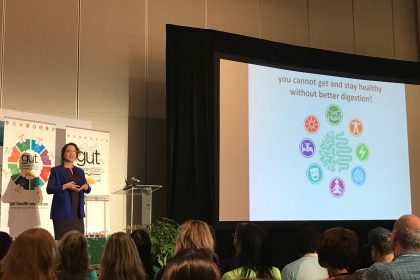
Probiotic supplements have been the hype of the health industry for the past few years, but the rage is dissipating. Consumers are starting to distrust probiotic pills, realizing a pill alone doesn’t deliver on promised health benefits.
“The thing is, you can’t just pop in a probiotic and get better health,” said Ashley Koff, a registered dietician and CEO of the Better Nutrition Program. “Consumers are waking up to the fact that our digestive health is more complicated than this. We need to start looking beyond probiotics.”
Good gut health requires more than just a single daily probiotic pill. Fermentation brands need to consider all the nutrients needed for a healthy gut as products are evaluated, marketed and advertised.
“You’re actually not what you eat. You are what you digest and absorb…The demands of our digestive health go so far beyond the probiotics,” said Koff, who spoke at Expo West on “Gut Health Revolution: A Radical New Approach Beyond Probiotics.” “When we walk about gut health, we often think about our stomach or our colon. But what were really talking about here are a bunch of different organs. We have to nourish multiple organs with complementary nutrient demands.”
The digestive system is the core to the entire body system. Koff said: “We cannot get and stay healthy without better digestion.” Most digestive health products isolate nutrients specific to one organ, she added. So while a probiotic may help the small intestine, for example, what feeds the probiotic? What makes the probiotic thrive?
Koff said most probiotic supplements and probiotic-infused products ignore other nutrients. What about magnesium, that helps relax the digestive tract? Probiotic supplements have been marketed as a one-time solution when other critical minerals, antioxidants, amino acids, fatty acids and alkaline are just as critical for gut health.
“We want to make sure we’re getting those nutrients that nourish the microbiome,” Koff said. Live, active bacteria will nourish the good bacteria in the gut, building the immune system. “If we’re getting probiotics, we need to get in prebiotics as well.”
Probiotics made $2 billion in sales in 2018, but their sales are slowing. Prebiotics, however, are doubling sales growth.
Simply put, prebiotics are the foods microbes in the gut like to eat. Mayco Clinic describes prebiotics as “specialized plant fibers (that) act like fertilizers that stimulate the growth of healthy bacteria in the gut.” Probiotics, on the other hand, are living organisms in specific straings of bacteria. Fermented foods are full of live, active cultures, like yogurt, sauerkraut, kimchi and kombucha.
Koff said people shouldn’t be getting all their prebiotics from a supplement. Most prebiotics should come from food.
“It should be deliciously easy for us to get the nutrients that help our gut,” Koff said. “No supplement in the world can override a poor-quality diet. …That’s why it’s so important when you look at a prebiotic that you’re looking at something that’s a whole food, (especially) if a whole food gets fermented.”
Relying on food for all nutrients, though, is hard for the majority of people, Koff revealed. If your probiotic choice is granola, for example, are you going to continue eating that same granola and that same service every day to consistently meet your probiotic needs? And a very small number of people actually eat gut-boosting foods daily. “I find that’s a limiting factor,” Koff said.
Koff specifically touted Country Life’s new line of digestive aids, called Gut Connection. The prebiotics contain EpiCor, a whole food prebiotic. The Gut Connection line contains eight products consumers can take for their needs, like balancing digestive, mood, sleep, stress or weight. Country Life sponsored Koff’s education session.
